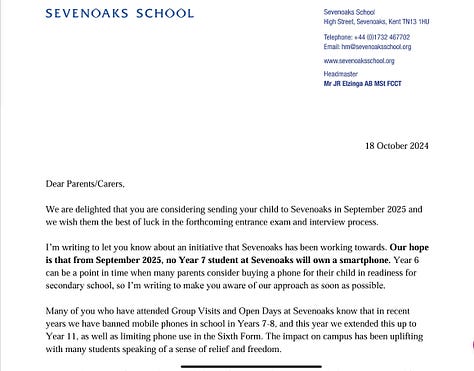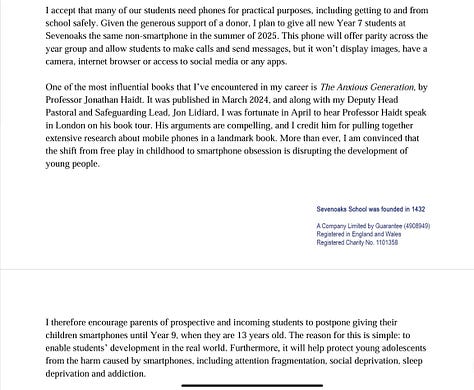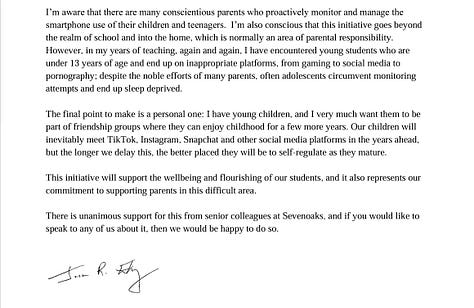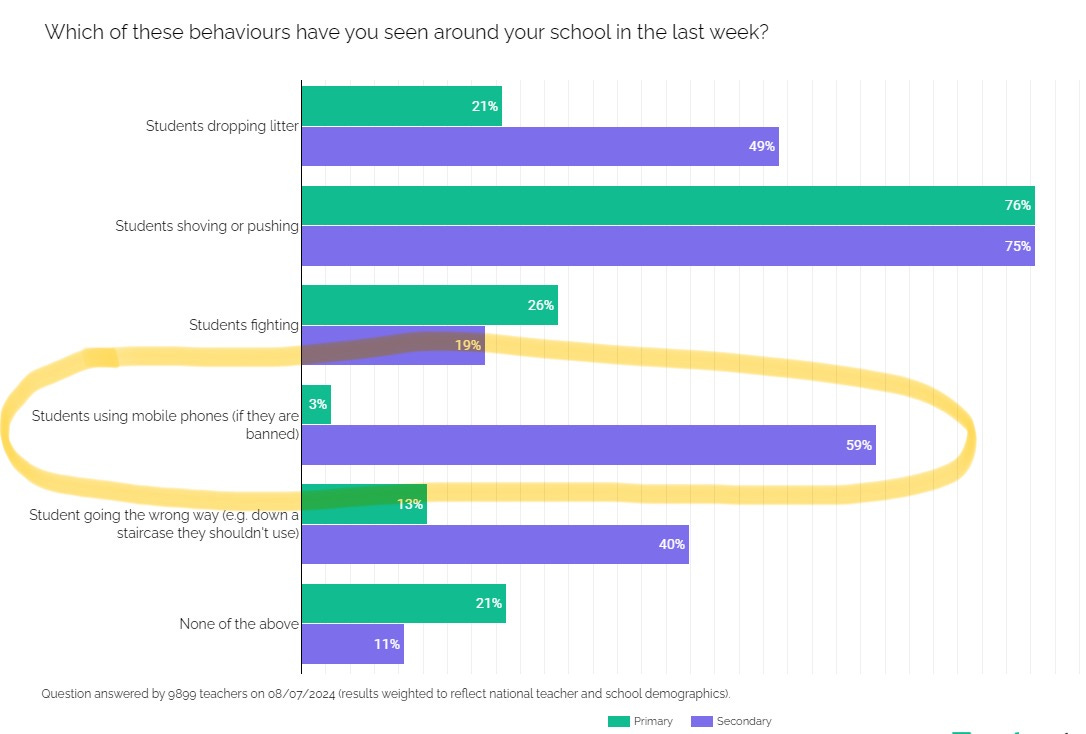Dear SfS Colleagues,
Well that was a strange week..
Interest in smartphone-free schools saw a massive injection of interest following some exquisite parliamentary hustle from Josh MacAlister MP..
.. so much so that the Department for Education moved immediately to stop the idea dead in its tracks.
Read on for more detail. We press on undeterred..
Ever,
Will
Big updates
On Tuesday, Josh MacAlister MP launched his Private Members Bill. One provision sought to make statutory (i.e. legally mandatory, perhaps examined by Ofsted etc.) February’s excellent guidance on smartphones in schools.
The BBC, the Guardian and the Mirror covered the story; Josh himself spoke on R4 Today about his aims, whilst SfC’s co-founder Joe Ryrie trailed the big day with an appearance on Monday’s Newsnight alongside a 14 year old who spends 9 hours a day on her smartphone. Even some big dogs from the front bench tweeted in favour.
From our perspective here at SfS it was a tumultuous few hours:
From this headline on Tuesday morning…
To this one by 10PM…
Where does the DfE’s response leave the movement for Smartphone Free Schools?
Legislative change has never been this movement’s top priority.
Of course it would have been wonderful to have the government mandate tougher smartphone restrictions for all schools, and we disagree with the DfE’s position. Heads may “already have the power to ban phones” but this graph from Teacher Tapp shows just how ineffective such bans are:
So we were pumped to see the measure included in Josh’s bill - and there may yet be opportunities for heads and teachers to voice their support for such measures in the coming months.
But we don’t need it.
Firstly, school leaders don’t just have all the power they need to go smartphone-free but, as we have been tracking these past months, many of the leading MATs and schools are committed to doing just that.
Secondly, parents are agitating for schools to go smartphone-free regardless of government measures. Just look at these overwhelming results in a survey carried out by Stonehaven, reported in iNews.
To watch
For those of you who missed our launch webinar, here is 60 glorious seconds of David Smith for you. I hope it convinces you to dig into the whole thing over half term.
Or tune into ITV Tonight’s segment last week - Smartphones: Time to Live Without Them? which featured colleagues from Smartphone Free Childhood and John Wallis Academy:
Tonight also speaks to Headteacher Damian McBeath from the John Wallis Academy in Ashford, who says banning smartphones has been “transformational” for his school. Every morning, pupils place their phones, smartwatches and earpods in a magnetically locking pouch where they stay for the rest of the school day. Pupils can only access phone pouches at the end of the school day once teachers have unlocked the magnets.
He says,
“Reports of online bullying, reports of incidents or online abuse, it's at a five year low. We were seeing rates of around 29% staff turnover that's reduced down to 17% in the last academic year. I think staff are happier in a school where they know they're protected and safeguarded by the leaders in the school.”
Model letters
A privilege of writing this newsletter is to be shown many of the best ways that school leaders have found to articulate a position on the topic of smartphones.
I often say that schools undervalue the level of moral authority they have on such questions: trust in educational institutions has not seen the precipitous decline seen in other institutions in e.g. politics and religion.
Below is a wonderful example from Jesse Elzinga, Head at Sevenoaks School in Kent, who uses his position as an educator, father and thinker to take a strong practical and moral stance on our issue. Well done and thank you Jesse!



Please get in touch if you’re looking for any support on letters, policies or other communications. We hope to have a library of the best on our site too.
Recommended Reading
UsForThem’s newsletter picked out some of the most egregious revelations from the TikTok leaks (also covered in the Washington Post.)
If you were ever in doubt that better regulation was needed to protect our children from commercial exploitation by the tech industry then just read this except from The Times:
One TikTok executive is purported to have said: “The reason kids watch TikTok is because the algo[rithm] is really good. But I think we need to be cognizant of what it might mean for other opportunities. And when I say other opportunities, I literally mean sleep, and eating, and moving around the room, and looking at somebody in the eyes.”
The unredacted lawsuit claims that TikTok has quantified how long it takes for young users to get hooked on the platform. Internal presentations say that the “habit moment”, as TikTok calls it, occurs when users have watched 260 videos or more during their first week on the platform. This can happen in under 35 minutes, since some videos run as short as eight seconds, the document said.
A report from an internal company group called TikTank noted that “TikTok is particularly popular with younger users, who are particularly sensitive to reinforcement in the form of social reward and have minimal ability to self-regulate effectively”.
The National Parent Survey produced another devastating snapshot of UK childhood’s saturation with screens:
*Screen time and mental health*
~ One in seven (14%) parents say their child spends 7 hours or more on electronic devices per day which is longer than the typical school day.
~ Parents say their child spends an average of 3 hours 20 minutes on electronic devices outside school in a typical weekday
~ Nearly half (47%) of parents say they have had a disagreement with their child over screen time in the last few weeks
~ 6 in 10 (64%) parents say their teen spend 3+ hours a day – equivalent to at least a month a year - on their phone, tablet or playing computer games
~ Nearly 4 in 10 (38%) parents say their child is missing family time as a result of their time spent on devices
~ 1 in 4 (25%) parents say their child has experienced a mental health challenge* in the past 12 months (FSM 40%) [*depression, bullying, sexual harassment, self-harm or eating disorders]
~ 2 in 5 (39%) children who experienced a mental health challenge* in the last 12 months missed school as a result (FSM 43%) [*depression, bullying, sexual harassment, self-harm or eating disorders]
Thanks to Jason Elsom and all at Parentkind for another stellar piece of work.
CNN published this contribution from a real life teenager last week, which threw up some of the practical difficulties of disentangling children from a childhood now embedded in the smartphone:
As for my social life, it’s expected that I’ll like other people’s posts, a social courtesy like waving hi across a hallway. As a teenage girl, I find that Instagram is in many ways necessary to high school life.
Outside of Instagram, I still need a phone.
There are group chats for my homeroom where we post the snack schedule and plan dress-up themes. (“CalcKILLus” was our calculus class group chat on Snapchat last year, used for deadlines, questions and general complaints.) There are group chats to discuss grades, post information about trips and for friend groups.
Roblox is “an X-rated pedophile hellscape”. Roblox has been accused of lying to investors about its user numbers and failing to protect children, a topic that was the subject of a question from Labour backbencher Mike Reader to the Secretary of State in Parliament last week too; meanwhile, Turkey has blocked the platform over child abuse fears. I loved this piece which reexamines the question of risk in children’s life.
I posted this tragic piece on LinkedIN too:
My generation was the first to be granted unsupervised and unlimited access to the internet during adolescence. At fourteen, I was already displaying my nude body on ChatRoulette, dispensing marital wisdom on Reddit. By fifteen, I would make the first of three posts on the subreddit r/amiugly, a forum that encourages strangers to evaluate each other’s attractiveness, despite having never seen each other smile, speak, cross a room, or rotate in three-dimensional space. 15/f and curious what people think, I wrote. I've never been a popular girl and I don't get much attention from guys. My teeth are kind of wonky but I'm getting Invisalign tomorrow. I would make another post the following year, then again at eighteen, to see if I’d gotten any prettier. I sought feedback in other ways too, on other platforms. I posted photos, drawings, collages, songs, videos. I wanted so badly for something to take off, go viral, launch me into notoriety.
Quick links and dates for your diary
I’d missed Giles Coren’s call for Smartphone Free Restaurants last month.
From the always amazing OSA Network,
“A US study has found that frequent social media use was associated with a higher prevalence of bullying victimisation at school and electronically, persistent feelings of sadness or hopelessness, and some suicide risk among students (considering attempting suicide and having made a suicide plan), both overall and in stratified models.”
EVENT: Is the internet good for children? – lecture by Prof Sonia Livingstone – 27 November








